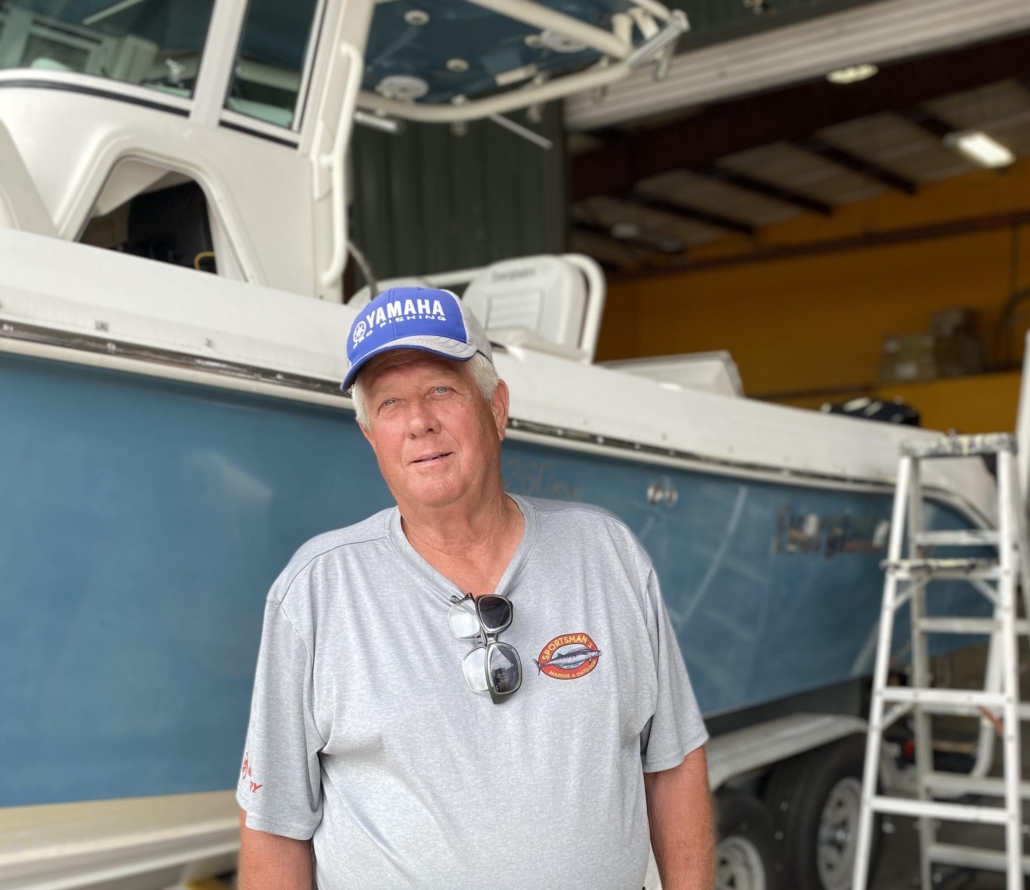This story is part of Appleseed’s “Cruel and Unusual” series, focusing on the people harmed by Alabama’s overreliance on excessive sentences, which trap people in deadly, dysfunctional prisons long after they have paid their debt.
By Carla Crowder, Executive Director

Leon “Bud” Hotchkiss at Sportsman’s Marine, a Fairhope boat dealership where he works days before returning to the Loxley Work Release Center
Every night after Leon Hotchkiss finishes up at the south Alabama boat dealership where he washes and moves boats, serves as a general maintenance worker, and is so trusted that he has his own key, he stands outside to wait for a ride. At the end of that ride, Mr. Hotchkiss is locked up with a key belonging to the state of Alabama, which has held him prisoner for 11 years and plans to hold him 29 more – all because of marijuana.
Mr. Hotchkiss, who just turned 68, is serving a 40 year sentence for growing marijuana on his own property. Acting on a tip from his ex-wife, the Baldwin County Drug Task Force went to Mr. Hotchkiss’s home and found marijuana plants. They arrested him on a charge of trafficking, which is a Class A felony in Alabama, the most serious category of crime.
During his more than a decade of incarceration, Mr. Hotchkiss has assisted in educational programs, led Narcotics Anonymous and Alcoholics Anonymous meetings, and maintained a stellar institutional record with zero disciplinary infractions. None of that mattered when he went up for parole in February; the Parole Board denied his request and set his next hearing off for five years, the maximum set off amount permitted by law.
It is unclear what public safety benefit is being served by Mr. Hotchkiss’s continued incarceration; he has been assigned to the minimum-security Loxley Work Release Center for years. His first job was sorting garbage at the transfer station in Bay Minette, commonly called “the dump.” Currently, he works at Sportsman’s Marine, a Fairhope boat dealership, where he washes and moves boats and assists with general maintenance. Though he has his own key to the dealership, he must return each night to the crowded doublewide trailer he shares with more than 45 other men at the prison camp.
“I cringe every night he goes back to Loxley,” said Jody Cullifer, who worked as general manager at Sportsman’s Marine until a few months ago. He described Mr. Hotchkiss as “the most dependable employee I’ve had in the three years I worked there.”
It was Mr. Hotchkiss’s co-workers at the boat dealership who contacted Alabama Appleseed about his case and requested assistance in advocating for his release. “Our entire staff is willing to do whatever it takes to help him with his case as we see this as a severe injustice and more than harsh punishment for his crime,” the initial email read.
“Marijuana was a lot better pain reliever than anything I took.”
Appleseed began researching the case, interviewed Mr. Hotchkiss, and reviewed the court records, which confirmed that Court records show that he signed a consent to search form, permitting Baldwin County Drug Task Force officers to search his home without a warrant. A Department of Forensic Sciences Certificate of Analysis shows that officers found approximately 2600 grams, which is 5.7 pounds of marijuana growing on the property. This total is on the low end of weight considered sufficient for a trafficking charge.
The Alabama Code permits a charge of trafficking in cannabis for possession of 2.2 to 100 pounds, whether or not there is evidence of distribution. Mr. Hotchkiss readily admits that he relied on cannabis to treat his aches and pains from a lifetime of hard labor. He served in the Marines, worked as a commercial fisherman, and worked in construction, helping to build luxury hotels that bring tourists to the Gulf Coast beaches. “I had a pine tree cut down on me one time that really messed up my head and my neck,” he said. Soon after moving to Alabama, he got a construction job building the Orange Beach Hilton. “They dropped a pallet of exterior sheetrock on top of me and it broke my collar bone, fractured my shoulder, my neck, and gave me this hernia I have in my chest in the top of my rib cage.”
He was prescribed opioid pain pills, he said, but chose not to take them long term as he did not want all the despair, and worse, that comes from opioid addiction. Besides, “marijuana was a lot better pain reliever than anything I took,” he said.
This was not Mr. Hotchkiss’s first marijuana arrest. In 1990, he served six months in prison for a conviction of conspiracy to distribute marijuana. No one is claiming he has lived a marijuana-free life, least of all Leon Hotchkiss, whose middle name is Bud.
However, even considering this prior conviction, the Baldwin County District Attorney’s Office initially offered a plea agreement, recommending a sentence of 15 years in the trafficking case and offering to dismiss a related charge of possession of drug paraphernalia. The plea agreement, dated June 29, 2012, was provided by the office of then-District Attorney Hallie S. Dixon to Mr. Hotchkiss’s appointed attorney. A 15 year sentence would have made him eligible for Correctional Incentive Time (good time) and release after 4.5 years (in 2017).
The record is not entirely clear as to why the case was not resolved pursuant to that plea offer. Shortly after the offer expired, Mr. Hotchkiss retained a new attorney and entered a blind plea to the trafficking and paraphernalia charges. At the sentencing hearing, his attorney told the Court: “Mr. Hotchkiss accepted responsibility as soon as consent was obtained by the police department. He was cooperative, told them everything, took them through the house, showed them all the marijuana. And, in addition, he told law enforcement that he was not making a living but that he had an injury and he was unable to work and earn money and that’s why he was growing the marijuana.”
A Baldwin County Circuit Judge sentenced him to 40 years in prison.
Parole-eligible again at age 72
In addition to his coworkers, numerous friends are disturbed about Mr. Hotchkiss’s continued incarceration as he heads into his eighth decade. They signed a support letter requesting that the Baldwin County District Attorney’s Office reconsider the 40 year sentence in light of Mr. Hotchkiss’s excellent institutional record, obvious lack of danger to the community, and parole denial. District Attorneys have extraordinary power and can use it to assist in reducing sentences even years after a conviction is final.
Hallie Dixon, the District Attorney in office at the time of his conviction, frequently made headlines during her tenure for questionable activities in the DA’s office. She settled an EEOC Complaint, arising out of allegations of sexual harassment filed against her. Several DA’s office employees fell sick after someone brought marijuana-laced brownies to the office. Longtime Baldwin County Judge Robert Wilters ran against her in 2015 until she dropped out of the race.
Here’s what Mr. Wilters said about her office at the time:
“There just appears to be, I won’t say total chaos. . . There is definitely a lack of leadership in the district attorney’s office and with that lack of leadership it trickles down to the assistants and investigators and everybody in the office and it’s time for a change in leadership there.”
Here’s where Mr. Hotchkiss’s case gets additionally complicated. Mr. Wilters was also the judge who sentenced him to 40 years back in 2012. Now Mr. Wilters is the current Baldwin County District Attorney.
So when attorneys at Appleseed contacted him about the community concern over Mr. Hotchkiss’s lengthy sentence, Mr. Wilters assigned an Assistant District Attorney to look into the request for a sentence review to avoid any potential conflict of interest. That prosecutor relayed that the office would not get involved and that he felt the parole board was the proper venue for relief.
Given this year’s parole denial and subsequent five year parole set off, which is an indicator that the Parole Board does not intend to grant parole any time soon, Mr. Hotchkiss could be incarcerated for the rest of his life.
Records from the Alabama Board of Pardons and Paroles show that the reasons parole was denied were: the severity of the offense and negative input from stakeholders (victim, family of victim, law enforcement or elected officials). The parole report also stated there was no victim in this offense.
Mr. Hotchkiss won’t be eligible for parole again until February, 2026. He will be 72 years old and will have served 15 years in prison for growing a substance that is legal in states where half of Americans live.
“Packed like sardines” and living with a permanent catheter
Alabama prisons are notoriously overcrowded and violent, and state officials are fighting system wide litigation over unconstitutional conditions. In response, Alabama is spending $1.082 billion on a massive new prison, and has signed a healthcare contract that will cost $1.06 billion tax dollars over the next four years, an amount so high, in part, because of soaring numbers of older people, like Leon Hotchkiss, in prison.
Cannabis has been approved for medical purposes, even in Alabama, and is fully legal in numerous states. And yet, short of an extraordinary intervention or major change in parole board practices, Mr. Hotchkiss may never get out of prison. Except, of course, to work in the community at his assigned work release job, that requires 40% of his salary, plus transportation costs, to be returned to the Alabama Department of Corrections.
Adding to his struggles, Mr. Hotchkiss suffers from a medical condition that requires he permanently rely on a catheter. While assigned to Kilby Correctional Facility soon after his conviction, he suffered from a bladder stone that went untreated for weeks, despite his multiple sick call requests to the Kilby infirmary. Eventually, he was transferred to an outside hospital, where he spent four months and lost 100 pounds before returning to Kilby with chronic, painful urinary tract issues.
Since he’s been assigned to the Loxley Work Release, it’s easier to avoid infections while changing his catheter. But this summer, only one bathroom was available in the doublewide trailer he shares with 45 men at Loxley. So that was challenging.
Alabama’s prisons are notoriously overcrowded and work release centers are no exception. Loxley houses 192 people in a space designed for 110. “There’s a top and bottom rack and we’re packed like sardines,” Mr. Hotchkiss said.

Bud Hotchkiss uses his spare time to make intricate paper boats out of catheter box packaging and Coca Cola boxes.
“Sometimes common sense demands a second look.”
Mr. Hotchkiss makes the best of it. He uses his spare time to make intricate paper boats out of catheter box packaging and Coca Cola boxes. He mailed his biggest one yet to his now 27-year-old son, who was only 16 when Mr. Hotchkiss was arrested.
Mr. Hotchkiss is grateful for the chance to leave the work release center most days, even though his work days are long and his paycheck is small, given the ADOC policy of keeping nearly half.
“I like boats, I’m very mechanically inclined. I’ve been around boats a lot in my life. I run the forklift,” he explained “I like running the forklift and keeping the yard straight. We do a lot of repowers, putting new engines on boats.”
Several of his coworkers, and even the owner of the boat dealership, recently signed a letter in support of Mr. Hotchkiss’s release and requested that the Baldwin County District Attorney’s office assist in obtaining a reduced sentence.
“We understand and respect your commitment to law and order in Baldwin County, and your dedication to the rights of victims. But sometimes common sense demands a second look. Leon Hotchkiss has paid dearly for the crime of growing marijuana, yet no victims were ever identified in this case. We would welcome an opportunity to meet with you, share more about our friend and co-worker, and discuss the possibility for better options for Mr. Hotchkiss as he nears his 70s,” the letter read.
That was in June, and the DA’s Office has since declined to assist.
His friends and coworkers are disappointed.
“He is an honest, hard working family man. When he wasn’t working, he loved to work in his yard and nurture his son Jason, who he was a single parent of. Jason was the light of his world. They had a most happy family. This included Jason’s pet turkey, chickens and his dog, Ellie. He was a wonderful friend who would cook holiday dinners for those of us who had no family close. He would show up quickly for anyone who needed help.” said his longtime friend Teresa Harpole, who spoke at the parole hearing where parole was denied and set off until 2028. “No one I have spoken to that is aware of his case in the community and beyond can understand his unusually harsh, seemingly excessive, sentence for this offense. He has suffered much for his crime. The day he was denied parole his Mother died. …He still could be a productive member of society. He has so many skills and gifts to offer. He needs to be able to spend the last time of his life with his family and friends, his loved ones.”
Mr. Hotchkiss holds out hope that somehow an opportunity for a few years of freedom will arrive so he can spend time with his children and grandchildren. He, accidentally, had a small taste of freedom when he first began his work release job.
“First time I was here, they were late picking me up. I was standing out front and they were 2 hours late picking me up. And I said to myself, ‘Bud, this is the first time in like 7 years you’re actually free.’ I could have just walked right away. It was a strange feeling. It ran across my mind, I could just walk away.”
But he didn’t. Instead he followed the rules. “I was hoping for the best, that things might work out and this might be over with.”





Leave a Reply
Want to join the discussion?Feel free to contribute!